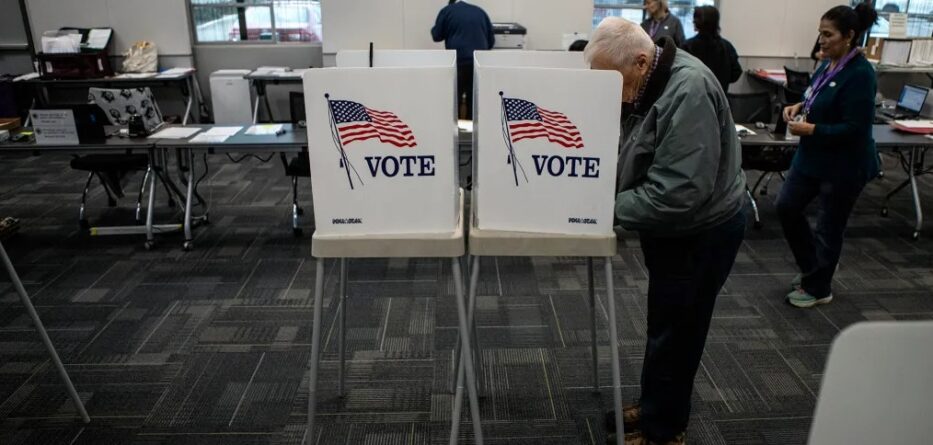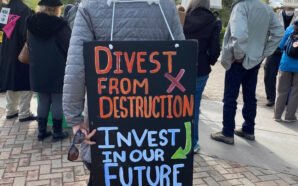Sameea Kamal
CalMatters
Around the U.S., the effort to withhold votes from President Biden until he demands a permanent ceasefire in Gaza has made some noise.
Following Michigan, in which 13% of Democrats voted “uncommitted,” 29% did so in Hawaii, 19% in Minnesota and 13% in North Carolina.
In California, more than six in ten likely voters support an immediate ceasefire, and some protests have called for the Biden administration to cut off military aid to Israel.
But that didn’t fully translate at the ballot box. Efforts in California — where there was no “uncommitted” option on the ballot — were less cohesive than in other states, according to some community organizers.
California leaders with the Council on American-Islamic Relations political action committee called for Democratic voters to leave the presidential race blank and make sure to vote in other contests. Other voters were encouraged to vote for Democrat Marianne Williamson, and some were told to vote for Peace and Freedom party candidate Cornel West, both of whom support a ceasefire.
“It’s always easier to vote for no one than it is to vote for somebody as a protest,” noted Christian Grose, professor of political science and public policy at the University of Southern California.
Statewide, with more than 80% of the projected vote counted as of Wednesday, Biden won 89% of votes in the Democratic presidential primary. That’s compared to nearly 100% in 2012, when Barack Obama ran against only three write-in candidates for a second term.
The typical protest vote in past non-competitive presidential primaries in the U.S. has been about 7%, according to the New York Times. Biden secured the party’s nomination Tuesday after primaries in other states.
But the equivalent of the “uncommitted” vote in California is harder to track.
Counties report results differently. For example, not every county publishes “undervotes” — ballots with the race left blank, and some don’t publish the total number of write-in ballots immediately. That includes counties with large Arab, South Asian or general Muslim populations, such as San Diego County. And not every blank vote, or vote for Williamson, was for a ceasefire.
Arbazz Mohammed, co-founder of Muslim Visionaries, a community organizing group based in the Inland Empire, said the parties’ election rules can make it difficult for voters to opt for less mainstream choices.
What can be gleaned from the numbers so far: In 39 counties for which the data was available, more than 160,000 voters left the race blank out of more than 3.1 million ballots in the Democratic primary. Another 100,000 voted for Williamson or a write-in candidate.
An uphill climb for protest votes
Whether or not voters have an “uncommitted” option is up to each state’s political parties. California is one of about 25 states in which Democrats don’t have that choice.
But there are other factors that make a protest vote challenging. Without significant resources, it’s hard to pull off in a state of California’s size, Grose said.
“It’s really hard to blanket the airwaves, engage in social media, really get the idea of the protest vote to the attention of the vast majority of the electorate, because it’s just so it’s such a big state,” he said.
It also takes time to get that messaging out, but a March presidential primary, instead of the usual June primary, made that difficult.
“California didn’t have as much time to get this campaign out to as many people as possible,” said Hena Zuberi, a board member of United Path America, a group that’s now working to promote the uncommitted vote in Maryland in its May primary. “So that’s something we’re trying to learn from … and start early here.”
But the biggest factor might be California’s diversity: No racial or ethnic group constitutes a majority of the population. And while it has a higher number of Arab Americans than Michigan, they make up a smaller share of the state’s total population.
In addition to demographics, there’s some political diversity, too.
While California is perceived as extremely left-leaning and progressive, apart from a few exceptions (including Bernie Sanders in 2020), the state has pretty much always supported the mainstream Democratic candidate in its primary, Grose noted.
And while a majority of likely voters supports a ceasefire, the Public Policy Institute of California poll notes that Californians are more divided on U.S. military aid to Israel, and on humanitarian aid to Gaza.
Flickers of impact
There were some pockets where more voters lodged their discontent.
In Los Angeles County, about 15% of Democrats didn’t vote for Biden, according to the CalMatters analysis of votes counted so far. In Sacramento and San Bernardino counties, the total was more than 11%. In all three counties, nearly 100% of Democrats voted for Obama in 2012.
Mohammed, the community organizer, said while voters knew it would be difficult to significantly shift the presidential race in California, they do plan to focus on competitive district races in the general election.
That includes the 41st Congressional District race between Republican Rep. Ken Calvert and Democrat Will Rollins — one of the races that could be key in determining which party controls the U.S. House.
Rollins is running about 22,000 votes behind Calvert in the primary. If Democrats want to make gains in the general election, Mohammad says the party will need to negotiate with voters in the district, where there is a growing Muslim community — who aren’t all Arab Americans, but who share a concern about U.S. policy on the Gaza war. Exact numbers are hard to find, since the Census is prohibited from asking about religion. But the Islamic Society of Corona Norco, located in the district, serves at least 6,000 congregants.
“Whether we’re going to vote for Will or not — and that’s playing out in many other races, from the congressional level all the way to the state level, and also local races,” Mohammed said. “If there’s a decent population of Muslims … and they do come out to vote, it could hurt or help.”
In general, about six in ten adults in competitive congressional districts support a ceasefire, according to PPIC.
On Saturday, President Biden called for a six-week ceasefire during Ramadan and a hostage-prisoner exchange, following his State of the Union address last week when he announced a new effort to bring in humanitarian aid by sea.
Meanwhile, for Californians with family in Gaza, political organizing continues with the constant specter of the humanitarian crisis.
“You feel this guilt that, you know, my taxpayer dollars and U.S. bombs are killing my people,” said Basim Elkarra, executive director of the Council on American Islamic Relations’ Sacramento and Central Valley chapter. “It’s just a very, very difficult situation, especially in Ramadan. Ramadan just started. And I can’t even imagine what my family and my people are going through at this moment where they’re starving, children are dying of malnutrition.
“It’s like a nightmare that’s not ending.”
CalMatters data reporter Jeremia Kimelman contributed to this story.






